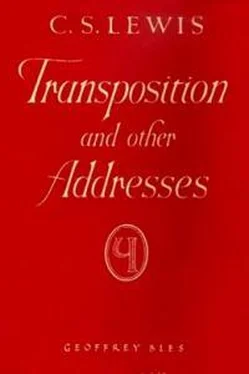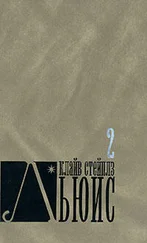A dim perception of the richness inherent in this kind of unity is one reason why we enjoy a book like The Wind in the Willows ; a trio such as Rat, Mole, and Badger symbolizes the extreme differentiation of persons in harmonious union which we know intuitively to be our true refuge both from solitude and from the collective. The affection between such oddly matched couples as Dick Swiveller and the Marchioness, or Mr. Pickwick and Sam Weller, pleases in the same way. That is why the modern notion that children should call their parents by their Christian names is so perverse. For this is an effort to ignore the difference in kind which makes for real organic unity. They are trying to inoculate the child with the preposterous view that one's mother is simply a fellow–citizen like anyone else, to make it ignorant of what all men know and insensible to what all men feel. They are trying to drag the featureless repetitions of the collective into the fuller and more concrete world of the family.
A convict has a number instead of a name. That is the collective idea carried to its extreme. But a man in his own house may also lose his name, because he is called simply "Father". That is membership in a body. The loss of the name in both cases reminds us that there are two opposite ways of departing from isolation.
The society into which the Christian is called at baptism is not a collective but a Body. It is in fact that Body of which the family is an image on the natural level. If anyone came to it with the misconception that membership of the Church was membership in a debased modern sense—a massing together of persons as if they were pennies or counters—he would be corrected at the threshold by the discovery that the Head of this Body is so unlike the inferior members that they share no predicate with Him save by analogy. We are summoned from the outset to combine as creatures with our Creator, as mortals with immortal, as redeemed sinners with sinless Redeemer. His presence, the interaction between Him and us, must always be the overwhelmingly dominant factor in the life we are to lead within the Body; and any conception of Christian fellowship which does not mean primarily fellowship with Him is out of court. After that it seems almost trivial to trace further down the diversity of operations to the unity of the Spirit. But it is very plainly there. There are priests divided from the laity, catechumens divided from those who are in full fellowship. There is authority of husbands over wives and parents over children. There is, in forms too subtle for official embodiment, a continual interchange of complementary ministrations. We are all constantly teaching and learning, forgiving and being forgiven, representing Christ to man when we intercede, and man to Christ when others intercede for us. The sacrifice of selfish privacy which is daily demanded of us is daily repaid a hundredfold in the true growth of personality which the life of the Body encourages. Those who are members of one another become as diverse as the hand and the ear. That is why the worldlings are so monotonously alike compared with the almost fantastic variety of the saints. Obedience is the road to freedom, humility the road to pleasure, unity the road to personality.
And now I must say something that may appear to you a paradox. You have often heard that, though in the world we hold different stations, yet we are all equal in the sight of God. There are of course senses in which this is true. God is no accepter of persons: His love for us is not measured by our social rank or our intellectual talents. But I believe there is a sense in which this maxim is the reverse of the truth. I am going to venture to say that artificial equality is necessary in the life of the State, but that in the Church we strip off this disguise, we recover our real inequalities, and are thereby refreshed and quickened.
I believe in political equality. But there are two opposite reasons for being a democrat. You may think all men so good that they deserve a share in the government of the commonwealth, and so wise that the commonwealth needs their advice. That is, in my opinion, the false, romantic doctrine of democracy. On the other hand, you may believe fallen men to be so wicked that not one of them can be trusted with any irresponsible power over his fellows.
That I believe to be the true ground of democracy. I do not believe that God created an egalitarian world. I believe the authority of parent over child, husband over wife, learned over simple, to have been as much a part of the original plan as the authority of man over beast. I believe that if we had not fallen Filmer would be right, and patriarchal monarchy would be the sole lawful government. But since we have learned sin, we have found, as Lord Acton says, that "all power corrupts, and absolute power corrupts absolutely". The only remedy has been to take away the powers and substitute a legal fiction of equality. The authority of Father and Husband has been rightly abolished on the legal plane, not because this authority is in itself bad (on the contrary, it is, I hold, divine in origin) but because Fathers and Husbands are bad. Theocracy has been rightly abolished not because it is bad that learned priests should govern ignorant laymen, but because priests are wicked men like the rest of us. Even the authority of man over beast has had to be interfered with because it is constantly abused.
Equality is for me in the same position as clothes. It is a result of the Fall and the remedy for it. Any attempt to retrace the steps by which we have arrived at egalitarianism and to re–introduce the old authorities on the political level is for me as foolish as it would be to take off our clothes. The Nazi and the Nudist make the same mistake. But it is the naked body, still there beneath the clothes of each one of us, which really lives. It is the hierarchical world, still alive and (very properly) hidden behind a façade of equal citizenship, which is our real concern.
Do not misunderstand me. I am not in the least belittling the value of this egalitarian fiction which is our only defence against one another's cruelty. I should view with the strongest disapproval any proposal to abolish manhood suffrage, or the Married Women's Property Act. But the function of equality is purely protective. It is medicine, not food. By treating human persons (in judicious defiance of the observed facts) as if they were all the same kind of thing, we avoid innumerable evils. But it is not on this that we were made to live. It is idle to say that men are of equal value. If value is taken in a worldly sense—if we mean that all men are equally useful or beautiful or good or entertaining—then it is nonsense. If it means that all are of equal value as immortal souls then I think it conceals a dangerous error. The infinite value of each human soul is not a Christian doctrine. God did not die for man because of some value He perceived in him. The value of each human soul considered simply in itself, out of relation to God, is zero. As St. Paul writes, to have died for valuable men would have been not divine but merely heroic; but God died for sinners. He loved us not because we were lovable, but because He is Love. It may be that He loves all equally—He certainly loved all to the death—and I am not certain what the expression means. If there is equality it is in His love, not in us.
Equality is a quantitative term and therefore love often knows nothing of it. Authority exercised with humility and obedience accepted with delight are the very lines along which our spirits live. Even in the life of the affections, much more in the Body of Christ, we step outside that world which says "I am as good as you." It is like turning from a march to a dance. It is like taking off our clothes. We become, as Chesterton said, taller when we bow; we become lowlier when we instruct. It delights me that there should be moments in the services of my own Church when the priest stands and I kneel. As democracy becomes more complete in the outer world and opportunities for reverence are successively removed, the refreshment, the cleansing, and invigorating returns to inequality, which the Church offers us, become more and more necessary.
Читать дальше











